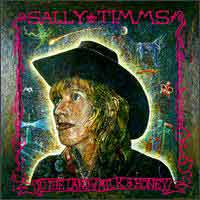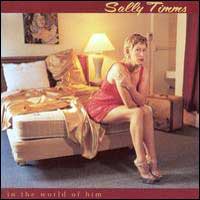| The Legacy From Punk
By Bill Wyman
Sally Timms' solo album, To the Land of Milk and Honey, begins with a
classic bit of world-weary torch singing: "Round up the usual suspects/
Somebody has broke my heart again." The mix of languor and humor,
delivered by her remarkable and expressive voice, set the tone nicely
for the striking collection of original and covers that follow. The record
is the first of Timms' solo work to be released in America.
Timms' voice is of course also one of the most beloved features of the
Mekons, the onetime British punk band whose geographic center of gravity
has shifted in recent years to Chicago. While co-founder Tom Greenhalgh
still lives in Britain, his partner Jon Langford now resides here with
his wife, as does former drummer Steve Goulding. Timms, who lives in New
York with her husband, made the record here with Langford and a host of
other Chicago musicians, notably Kingsize studio owner Dave Trumfio, who
helped produce the album, played bass, and contributed a song. (Langford,
Goulding, and Trumfio, along with Poi Dog Pondering's Dave Crawford, backed
Timms when she played a rare U.S. date at Chicago's Double Door this past
May.)
Timms' conversation, delivered in an caustic English drawl, is a challenging
mixture of sarcasm ("Those little tunes I'd been writing; I had to
share them with everyone,") seriousness ("I don't believe in
using irony. What's the point? Then it's just a joke record,") self-deprecation
("I'm the laziest woman in any business,") sharp ripostes to
questions on subjects deemed boring ("Great. Fas-cin-a-ting,")
and wild stories of the touring Mekons sliding across America on a slick
of alcohol and vomit. She grew up outside of Leeds; as a child she sang
in the church and school choirs but soon had her head turned around, first
by glam ("David Bowie was my ultimate hero") and then by punk.
"I remember going into W.H. Smith. They printed the chart listing
every week, and there'd be a big gap where number one was, because it
was [the Sex Pistols' banned] "God Save the Queen."
Having met the Buzzcocks' Pete Shelley she got involved in the punk scene
and intermittently did musical projects. These included a collaboration
with Shelley ("It's a drug record, basically, a punk drug record")
called Hangahar, a country-flavored group with violin and accordion, and
an all-female outfit called the Shee Hees ("It was all experimental,
no structure. We did Lionel Ritchie songs. Our show stopper was 'Hello.'
We were riot grannies.")
Amidst a classic series of Mekons albums, she put out a solo record,
Somebody's Rocking My Dreamboat, in 1988 that never saw American release.
For her second effort she acknowledges wanting to make a "classic
sounding record." The songs she chose which include surprisingly
compelling tracks from John Cale, Jackie DeShannon, and Procul Harum,
as well as four terrific new Timms-Langford numbers take on
political and personal issues but with a grace and perspective that stands
apart from the self-obsessiveness of the alternative age. "I don't
have any sexual demons," she says. "I never had a problem getting
a boyfriend. I don't know if I set my standards too low, but a lot of
the kind of problematic [themes] that lot of younger women have don't
seem to effect me so much."
Instead, she uses her alluring and powerful vocals "I
have a very smooth-sounding voice, a Julie Andrews voice, basically"
to animate socio-political themes: the outsiders in Procul
Harum's "Homburg" and Trumfio's "Junk Barge," and
the caustic commentary in the closing "Deep" ("You're too
nice to say a thing/ As they hold your head under.") The Mekons took
punk's ideals to heart and, like exactly none of their contemporaries,
never lost them. Nearly twenty years on, band members have the empty pockets
to prove it. Their career, and Timms' new album, are reminders that punk
was something other than a musical form. "We don't try to build up
a mystique," Timms says seriously. "People view us as their
friends, not rock idols. That's our legacy from punk, that it could be
anyone up there, and you shouldn't distance yourself too much."
(Chicago Reader's Music Section., Copyright (c) 1996 Chicago
Reader, Inc.)
|





